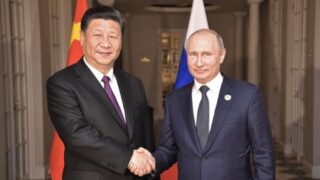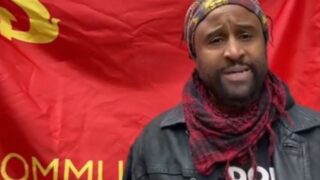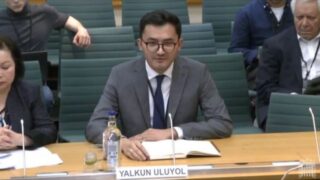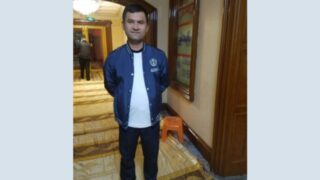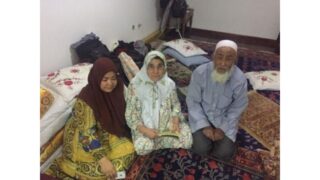Holocaust Memorial Week stirred flames of remembrance in the pens of exiled poets, displaced through their religion or politics.
by Ruth Ingram


The terror of facing another New Year away from home, being surrounded by photos of murdered relatives scattered around the house as a child, no one daring to call them by name, the guilt of not returning to bid fathers and mothers goodbye and the all consuming fear of not remembering.
Some of the intense emotions expressed by exiled poets in London during Holocaust memorial week, gathering in one of London’s oldest Georgian terraced buildings to remember their own personal and corporate trauma through poetry and verse; united by their experience of man’s inhumanity to man, but celebrating resilience of the human spirit against all odds.
The “Flames of Remembrance” event organised by Exiled Writers Ink, to mark not only the Second World War Jewish Holocaust but other mass atrocities around the world, featured friend of Bitter Winter, Uyghur writer and poet Aziz Isa Elkun, acclaimed Iranian exiled poet Alireza Abiz, and two Jewish poets, Jennifer Langer, founding director of Exiled Writers Ink, and Viv Fogel, both children of Holocaust survivor refugees.
The devastation caused to the Jewish community as the effects of the genocidal crimes reverberated prompted Theodore Adorno, the eminent German philosopher to say, “To write poetry after Auschwitz is barbaric.” Poets write about their suffering and that of their people for many reasons, but organiser of the event Aviv Fogel disagrees with Adorno. She is convinced that although poetry might not change politics, “it could heal, bring hope, touch our souls and help us to be better people.”
Loss and memories of a bygone world permeated the childhood of Jennifer Langer whose parents fled Nazi Germany and became the only survivors of their respective families. The pain of the fate of those they had left behind never left them, and infused not only the rest of their lives but that of their daughter who experienced intense secondary trauma throughout her childhood.
The past was not spoken of but was ever present, and all her questions were stonewalled. The ghosts of Nazi Germany were their constant companions. Her parents’ “secret” conversations, their problems and anxieties, interminable waits from the Red Cross tracing service filled their lives. Would their families be traced, now or never? Wall to wall German at home, sauerkraut and sausages was a surreal environment for a young girl growing up in post war Britain. They were the vanished Jews of Germany, not quite belonging to the past or their new future.


The constant search for the elusive past is a common theme in exiled writers’ work. Barriers of silence surrounding relatives whose lot was never mentioned, promoted Langer’s search for her lost relatives after her parent’s death. She was desperate for answers but in her poem “The Angel of History,” all she found were “a few faded footprints and shadows dancing on walls.” “Their names on lists of victims, reports concluding no further trace of him or her.”
At times she thought the search had ended, but “memory swaggers like a peacock. History pursues me hungrily, refuses to lie down like a slumbering dog. Sticks to me limpet tight.” She writes that she has “done her all to unwrap the past,” but knows “it is as elusive as quicksilver.”
“Shall I leave you now? Can I mislay you somewhere? Blown as I am ever further into the present. Let me savour the freedom of the moment. Can I rise above the past for a while?” She asked.
Aziz Isa Elkun, barely thirty years old when he was exiled to London from East Turkestan, now the beleaguered Xinjiang “autonomous region” of North West China, first learned about the Holocaust through reading Anne Frank’s diary when he came to England. Ignorant of Jewish history growing up in China, he is heartbroken that his people too are forced to commemorate the Memorial Day with an even heavier heart against the backdrop of their own genocide in his homeland.
Trapped outside the borders of his nation, forbidden to return, his poetry is consumed with the sadness of longing, of missing, of anger and grief. He writes to “discharge the agony that stays in his soul.” Poetry gives words to feelings so deep they linger imperceptibly but surface when the autumn leaves turn, when he searches Google Earth for his father’s grave only to find it has become a car park, when he tends his rose garden to keep the fragrance of his homeland alive and when he marks the passage of time by wondering whether he is destined to die with suffering imprinted on his heart.
Alireza Abiz wonders that ordinary, not extraordinary people have been the instruments of barbaric atrocities around the world. Keeping the memory of Holocaust alive was vital, he thought, not simply to prevent future events, but to be conscious that we are all capable of terrible things.


He writes to remember. To remember a stream of “kindly” interrogators who have been his family’s constant companion and still pursue his sister who as he writes is being cross-questioned in his home town today. He does not expect healing to come but his poetry replaces the diary he used to write before captors used his early youthful entries to batter him with their questions for months on end.
“For a long time now a black cat has been sitting outside on my verandah, with his eyes shining,” he writes.
“Looking at me through the darkness.”
“It’s been a long time since I was a sparrow,
Since I was a dog, even since I was a backyard hen.”
“But still this black cat is sitting on the verandah,
Outside my room, with his eyes shining,
Looking at me through the darkness.”
Viv Vogel wrote her first Holocaust poem twenty years ago. Despite never having witnessed Auschwitz, its effects she says never left her. “It was always there.” The slightest thing could trigger a thought or memory that would catapult her into the terror she had inherited from her family growing up. Once the mere act of holding a wasps nest hurtled her back in time to the camp huts.
“The bunkers are empty now
A contrast to the hum and shove, cram and shift,
Huddling close for warmth.
A tear, a crust a whispered hope.
Ash dust coats our shoes, no trees, no birdsong here.
Corridors echo silently, row on row.
Boned feet, stone cold floor.
Names that were list upon list. And here was, and here, and here, were scoring the days etched on brick or wood,
Like growth marks by the nursery door.
What are they now?
Whispers, crusts haunted skull eyes that follow you
Wings that perished.”


Wherever she goes, Viv is followed by the secondary memories.
“When I see dense forests, barbed wire, rail tracks, something in me remembers.
The stench of it slips between the lines
Urges me to transcribe
Urges me to make sense of it.
But I can’t. I was not there.
Striped pyjamas.
A soft leather valise
A postcard from the Stoke Potteries.
Funnels of dark smoke unfurling.
A lost child’s shoe by the canal
The absence of birdsong
A field of stones
And silence.
Many will roll their eyes.
‘Move on.’
So I do not write about the Holocaust
I was not there. I was not there.”
Aziz consumed with longing for the land to which he knows he will never return and a mother whose latter years will be spent alone, separated from her only child, spends his days burning with the injustice and pain of a system that has closed the door forever to the land he loves. He asks himself whether he should allow his heart to blaze unbridled.
“While my emotions are still living through the seasons,
While my love and hate are in full battle,
While my laughter and tears have become inseparable,
Should I allow my suffering heart to become aflame?
When autumn leaves floated on the water,
I could see the reflection of my trembling body.
There are many unanswered questions about life.
Will Elkun die one day with this suffering?” he asks.
With the passing of years, he sometimes allows himself a few morsels of optimism.
A visit to Sardinia in 2016 where “pastries and noodles” reminded him of home and “the figs of Artush [an area in Southern Xinjiang famous for the fruit] grow here throughout the seasons,” he felt hope rising again for the future.
“Hopes are rising on the Mediterranean Sea
They arouse great desire in the heart of a desert boy,
Gusts of wind kiss my chin without asking consent,
They drag me to the sea to swim with the sun.
….Elkun seeks a moment of comfort here,
Even though his life belongs to the Tarim!”
Note: The Tarim is the longest river in the Uyghur homeland running 1,321 kilometres along the Northern edge of the Taklamakan Desert before turning East.


